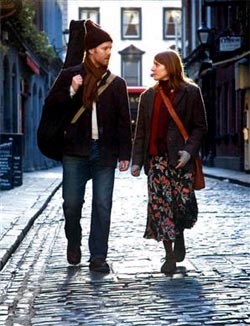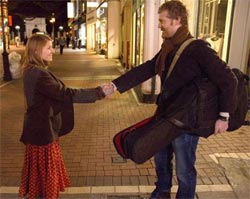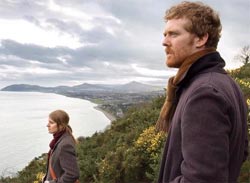 Once (2006, Dir. John Carney):
Once (2006, Dir. John Carney):
Once, Once
I knew how to look for you
Once, Once
But that was before
Once, Once
I would have laid down and died for you
Once, Once
But not any more
— Glen Hansard and Marketa Irglova, “Once”
They don’t make musicals like they used to. For some, that might be a good thing — in our increasingly prosaic world, the idea that someone would break into song and dance at the slightest provocation seems unreal, overly fantastic, outside the realm of possibility (never mind that classic musicals remain one of Hollywood’s best and only expressions of unfettered imagination, without all that “reality” stuff getting in the way). And thus musicals have become more hidebound over recent years, working ever more strenuously to couch their flights of fancy in “realistic” terms. Just look at Chicago: You see, they’re not really singing and dancing, it’s all in their heads!
The arrival of Once suggests that we’ve reached a new low in the prosi-fication of musicals — the songs are real songs, because this is a story about real musicians! Shot in Dublin over a period of 17 days and directed by John Carney, former member of the band The Frames, the film is decidedly un-musical — filmed on gritty digital video, it has no big dance numbers, no glitzy stars, no big finale. Not even romance — at least, not the kind of romance you’d expect in a musical (more on this in a bit). Yet Once can’t be dismissed as a ramshackle musical-wannabe because it captures something no musical has captured in quite a while: a generosity of spirit, a warmth and sincerity in the telling.
 The title Once suggests the preamble of a fairy tale (“Once upon a time…), and like a fairy tale, the film is simple in the setup: Guy meets girl, guy and girl make beautiful music. In this case, the guy (Glen Hansard, lead singer of the Frames) is a busker on the streets of Dublin, making coin with covers of Van Morrison songs by night and working in his dad’s vacuum cleaner shop by day. The girl (Czech musician Marketa Irglova) is an immigrant who hops from job to job as a cleaning lady, and she happens to need her vacuum repaired. Impressed by his original songs, the girl tries getting friendly with the guy; still smarting from a recent breakup with a girl who’s gone on to the “big time” in London, the guy is initially reticent. When the two of them find themselves in a music shop, and the girl proves to be an accomplished singer and piano player, they collaborate on a song on the spur of the moment…
The title Once suggests the preamble of a fairy tale (“Once upon a time…), and like a fairy tale, the film is simple in the setup: Guy meets girl, guy and girl make beautiful music. In this case, the guy (Glen Hansard, lead singer of the Frames) is a busker on the streets of Dublin, making coin with covers of Van Morrison songs by night and working in his dad’s vacuum cleaner shop by day. The girl (Czech musician Marketa Irglova) is an immigrant who hops from job to job as a cleaning lady, and she happens to need her vacuum repaired. Impressed by his original songs, the girl tries getting friendly with the guy; still smarting from a recent breakup with a girl who’s gone on to the “big time” in London, the guy is initially reticent. When the two of them find themselves in a music shop, and the girl proves to be an accomplished singer and piano player, they collaborate on a song on the spur of the moment…
It sounds like something from A Star Is Born, but the scene in which Hansard and Irglova play together for the first time is anything but precious, and succeeds as a set piece because it captures the honest joy of performance, the way musical ideas and noodlings sometimes coalesce into something whole, like magic. Those going into Once expecting a “boy meets girl, boy and girl fall in love” story may be disappointed by the narrative thrust of the film, in which Hansard and Irglova certainly grow close, but are halted just short of love due to other commitments (Irglova cares for her mother and young daughter while waiting for her estranged husband to come to Dublin, Hansard wants to give it another go with his old flame) — the true romance taking place in this film is the romance of music.
 Thus the story of Once is shaped not by the story of two people falling for each other, but two kindred spirits getting together to make an album. As musicians, Hansard and Irglova are perfect sparring partners — he’s impassioned and full of bluster, she’s reflective yet heartfelt. The music they make tends to shade towards the Hallmark side of the dial (“Take this sinking ship and point it home, we’ve still got time”), but in the context of the film, it’s the perfect dramatic counterpoint to the understated goings-on — like all good musicals, we learn more about these people from what they sing than from what they say. Hansard and Irglova also play off each other well as actors; he has a hangdog charm (one thinks of Hugh Laurie with a shaggy Celtic upbringing), and she is an intriguing mix of ballsiness (the way she tosses off the word “fuck” as if it’s just another word is a delight) and vulnerability.
Thus the story of Once is shaped not by the story of two people falling for each other, but two kindred spirits getting together to make an album. As musicians, Hansard and Irglova are perfect sparring partners — he’s impassioned and full of bluster, she’s reflective yet heartfelt. The music they make tends to shade towards the Hallmark side of the dial (“Take this sinking ship and point it home, we’ve still got time”), but in the context of the film, it’s the perfect dramatic counterpoint to the understated goings-on — like all good musicals, we learn more about these people from what they sing than from what they say. Hansard and Irglova also play off each other well as actors; he has a hangdog charm (one thinks of Hugh Laurie with a shaggy Celtic upbringing), and she is an intriguing mix of ballsiness (the way she tosses off the word “fuck” as if it’s just another word is a delight) and vulnerability.
 Once is very matter-of-fact yet lively about its characters’ milieu — Irglova’s home is an overcrowded tenament building where neighbors pop in without warning to watch TV, but it retains a certain charm, while Hansard divides his time between the cold streets and his instrument-infested room at his dad’s house, living the life of a kid who hasn’t grown up. During the course of the movie we tour the Emerald Isle’s sparkling coast, attend an intimate get-together with folk singers, and are given a tutorial on how to bargain for recording studio space. As Hansard and Irglova gather a band and record an album over a whirlwind weekend, the “production numbers” accumulate: Hansard composing a tune to accompany home videos of his lost love, the act reclaiming MTV-style sentiment as something more personal; the initial recording session, which begins with apprehension and reaches joyful release; a late-night piano ballad that finally redcues Irglova to tears; and most memorably, Irglova walking the Dublin streets at night, walkman in hand, singing improvised lyrics to an instrumental, the camera following her all the way from the drugstore to her home in a movement that is simple yet as liberating as any choreographed setpiece.
Once is very matter-of-fact yet lively about its characters’ milieu — Irglova’s home is an overcrowded tenament building where neighbors pop in without warning to watch TV, but it retains a certain charm, while Hansard divides his time between the cold streets and his instrument-infested room at his dad’s house, living the life of a kid who hasn’t grown up. During the course of the movie we tour the Emerald Isle’s sparkling coast, attend an intimate get-together with folk singers, and are given a tutorial on how to bargain for recording studio space. As Hansard and Irglova gather a band and record an album over a whirlwind weekend, the “production numbers” accumulate: Hansard composing a tune to accompany home videos of his lost love, the act reclaiming MTV-style sentiment as something more personal; the initial recording session, which begins with apprehension and reaches joyful release; a late-night piano ballad that finally redcues Irglova to tears; and most memorably, Irglova walking the Dublin streets at night, walkman in hand, singing improvised lyrics to an instrumental, the camera following her all the way from the drugstore to her home in a movement that is simple yet as liberating as any choreographed setpiece.
Once the album is finished, the film should likewise be finished as well, but loose ends need to be wrapped up, our soul-mate musicians resigned to going their separate ways, and even these moments are presented blarney-free — still, there is something unsatisfying about Hansard and Irglova’s parting, mainly because their past loves remain specters, talked about but never felt, and thus their rationales for leaving each other seem undernourished. Or perhaps we’ve been suckered by old-fashioned musicals into thinking that relationships must be escalated in time for the climax. Surely two people who make such beautiful music should be partners in some fashion …
Despite the lack of an ending that measures up to the merry music-making that precedes it, Once has the good grace to leave us on a winsome note — Irglova happily pounding away on a new piano, life in sunny Dublin going on outside her window. I’ll wager that Once won’t inaugurate a new golden age of musicals, but hopefully it’ll serve as a worthy reminder that modesty and charm go a long way these prosaic days.
